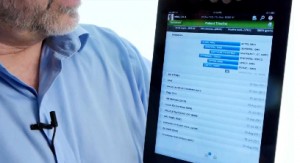
Allscripts' recently launched Wand EHR iPad app
In late 2010 MobiHealthNews reported on one of the first announced integrations of data from a patient-facing mobile health application and an electronic medical record in use at a healthcare facility: WellDoc integrated its DiabetesManager program with Allscripts' EHR because that happened to be the system in use at WellDoc's partner site, George Washington University Medical Center. Such integration is not without costs, of course, and in that case the US Air Force picked up the tab as part of its own research into diabetes management.
This week Allscripts CEO Glen Tullman penned a sprawling, enthusiastic column for Forbes that includes his experiences with smartphone-based, real-time video consults with physicians, the rise of connected personal health devices, and more. Tullman also included a reference to Allscripts recent work toward mobile health and EHR integration front at tail end of his post:
"As doctors begin to get compensated for keeping their patients healthy and not just for treating them when they’re sick, this kind of real-time inexpensive data will be essential. This exact scenario is already happening at UMass Memorial in Worcester, Mass., where diabetes patients upload their glucometers into an app called MyCareTeam that analyzes the data and turns it into actionable insights that are provided to physicians, nurses and diabetes educators through their Allscripts Electronic Health Record. It’s the future of health care, right before your eyes."
Allscripts announced the collaboration with MyCareTeam last month, but Tullman hints that soon data from the connected fitness device Fitbit will find its way into EMRs.
Fitbit's newest device, called the Fitbit Ultra, is a wireless-enabled, fitness and calorie tracking device small enough to clip on to the user’s clothing. Fitbit leverages an internal motion detector to track the wearer’s movement, sleep, and calorie burn during both the day and night. Fitbit provides users with metrics like: steps taken, miles traveled, calories burned, calories consumed, bedtime, time to fall asleep, number of times awoken, total time in bed, and actual time sleeping.
"And soon, the Fitbit’s rich health data will be automatically entered into your electronic medical record. There your doctor could use it along with her own clinical notes to take better care of you. She’ll now know what you actually do, not what you say or think you do. Ask any doctor: That knowledge can make all the difference."
Be sure to read Tullman's full column over at Forbes here.














